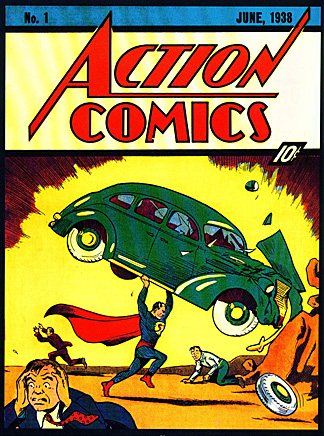Superheroes: powerful, fearless — and permanently marginalized?
According to Dr. Matt Yockey, assistant professor of film, superheroes live so vividly in our imaginations at least partly because Batman, the Flash, Wonder Woman et al are outliers, existing on the margins of the society that bred them.“Superheroes fulfill everything in our culture, in a way,” said Yockey, who studies superheroes as part of his specialty in Hollywood film genres.
It took time, though, for the costumed crusaders to grow into their roles.
The superhero, he said, was born in June 1938 with the first appearance of Superman in Action Comics.
“It’s rare that you can so pinpoint the birth of a genre,” Yockey noted of the famed comic book; in 2010, an original was auctioned for $1 million.
From the first, he added, Superman’s power reflected a superior morality: “In his earliest incarnation he was very much a social crusader. In that first appearance, he saves a wrongfully convicted man from the electric chair, he stops a man from beating his wife, and confronts a crooked senator making money off illegal arms sales.”
He was, in fact, standing up for the little guy — a fact not lost on Superman’s teenage creators, writer Jerry Siegel and artist Joe Shuster, both the children of working-class Jewish immigrants who came to North America.
 “Most comic book writers, artists and editors were Jewish, well aware of what was happening in Europe in the late 1930s,” Yockey said. “They were agitating through the superheroes about what America should do.”
“Most comic book writers, artists and editors were Jewish, well aware of what was happening in Europe in the late 1930s,” Yockey said. “They were agitating through the superheroes about what America should do.”
Thus Captain America delivering a swift right cut to Adolph Hitler on a comic book cover. And when an Amazonian princess decides to join America’s fight against the Axis powers, Wonder Woman is born.
“Once America entered [World War II], the superhero was brought directly into the patriotic fold,” Yockey said. “It was very clear-cut who the good guys and bad guys were, because Captain Marvel and Superman and a whole army of these heroes were on our side. They defined the American character.”
It was potent stuff, irresistible. By 1945, half the country — some 70 million people — were reading comic books.
The genre, however, declined in popularity after the war, Yockey said: “Our enemy during the Cold War is an ideological one, not one we fight with a standing army. And the decline takes place during one of America’s biggest economic booms, when we’re more interested in finding our American identity through our habits of consumption.”
So by the time of the U.S. Senate hearings on the comics’ dangerous allure, men in tights socking villains already were becoming passé.
Taking their place was the satiric perspective of Lenny Bruce, Mort Sahl — and MAD magazine.
“MAD magazine brought a more subversive tone to the industry, which infiltrated the superhero genre in the 1960s with Marvel Comics, reinventing the superhero not as a square-jawed paragon of American values but as the neurotic boy next door who’s as worried about getting a date as he is about fighting a criminal,” Yockey said.
“They may stand for accepted values, but they always stand at the margins of the society that breeds those values. They are excessive, extraordinary, not the norm — yet they defend the norm.”
The 1960s saw a new generation of writers and artists in the comics industry. They’d grown up as comics readers, and they had the freedom to develop the rich narrative universes that today define the superhero.
“Thanks to blockbuster movies, that kind of superhero has become mainstream,” Yockey observed. “With the success of last summer’s ‘The Avengers,’ we can see that the genre is not going away.”
Socially marginalized or not, superheroes continue to help define us, Yockey said: “Their best attribute is that we can relate to them. They’re a blank canvas on what we aspire to be.
“I think their primary value lies in their ability to straddle the lines of social acceptability, always battling for good yet remaining outliers. We all imagine ourselves in a similar role, especially in America, with its paradoxical collection of individuals.
“So you might say that superheroes resolve the paradox — by being so very extraordinary, they’re able to defend the status quo.”